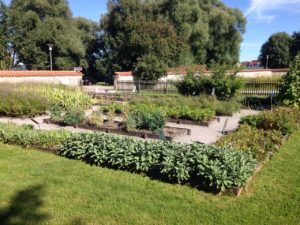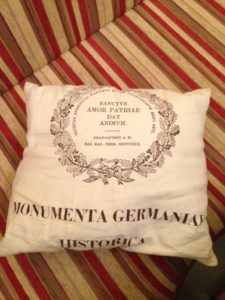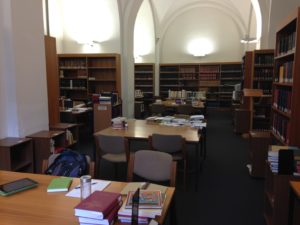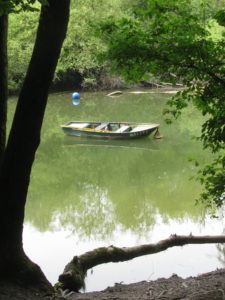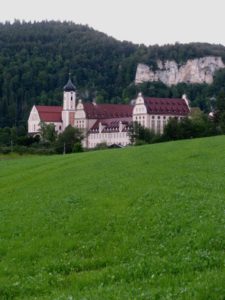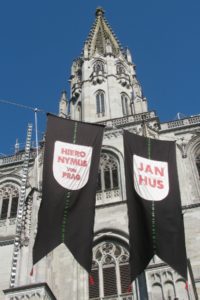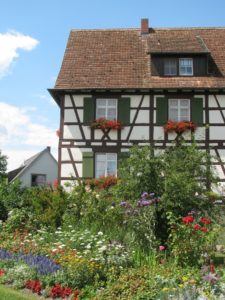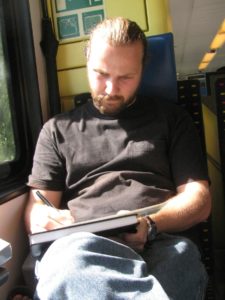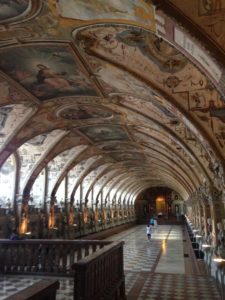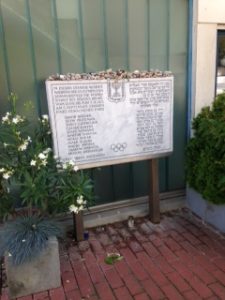Although I am fully aware that I am in Berlin to study German, I am still speaking English from time to time to keep my English in use. Because both English and German are foreign languages to me, I should prevent both of them from getting rusty. Yet this week I noticed something interesting – when I was ordering a sandwich deliberately in English at a breakfast shop, my tongue felt stiff, and at that moment did not not how to describe the sandwich in English, which I usually refer to in German “die Baguette mit Schnitzel”. I then switched to German to clarify. It seems as if my German, although still far less proficient as my English, acquires more fluency and naturalness in this totally native environment.
According to my German teacher of the first week, this is a good sign – it indicates that one is starting to think in German, and consequently, one’s mind and speaking habits are more on the German track. According to her theory, when one studies a new language, this new language takes up space in the part of the brain that deals with foreign languages, and as one learns more than one foreign languages, these languages compete for the limited space in that part of the brain. As a result, when a new foreign language comes in, and a foreign language acquired earlier is not actively in use, this language would be “marginalised”. For this reason, she speaks different languages to her multilingual colleagues from time to time, to keep these foreign languages in a “balance of power”.
I don’t know if this theory is scientifically proved, but my personal experiences prove it to be true. My experience of difficulty in English at the breakfast shop at implies that German and English are not only two languages different in vocabulary, grammar, and pronunciation, but also more importantly, grounded in two mentalities, two ways of thinking, and two seemingly similar, but starkly different cultures. I would characterise my first two weeks as a confrontation with the exoticism of Germany. There are many things about Germany that I have not expected before I came here. Having spent one year in the US and adjusted to the American way of life, I have noticed many things particular of Germany, but do not typically exist in the US. Here is an incomplete list of examples thereof:
1) A highly mobile lifestyle especially in cities, characterised by the prominence of renting apartments, the wide use of bikes, and a highly developed public transportation system that connects every corner of a city and every town within Germany.
2) The practice of husbandry to protect environment, as in the cases such as you have to bring your own bag for shopping, otherwise the plastic bags in supermarkets cost; the rarity of air-conditioners to prevent further global warming; a refund of 25 cents as an encouragement for people to bring back empty water bottles to shops for recycling.
3) The predilection for bright colours, especially bright yellow, sometimes also bright green and red. Especially noteworthy is that yellow is the theme colour of many major companies and manufacturers, such as Lufthansa, BVG (Berlin Public Transportation Authority), Deutsche Post (German Postal System), Deutsche Oper Berlin (a major opera company in Berlin), Berliner Philharmoniker, Deutsche Grammophon (Classical music recording company), Jack Wolfskin (sport equipment and clothing). The combination of yellow and black is very favoured: some say it is reminiscent of the national tricolour, some say its simply eye-catching. In contrast, I recall that the prominent colour in the US would be a nostalgic dark blue or red in most cases.
4) The surprisingly casual dressing style. While most people would expect Europeans to be more conservative and probably “stiffer” than Americans, most people here dress with a, if not always casual, but a practical flair.
The list would go on indefinitely, but the point here is not simply to list cultural differences, but to indicate how different the two cultures, and consequently, two mentalities are, and implications regarding language learning are to be derived therefrom.
Most English-speaking German learners, including myself, are equipped with a German-English two-way dictionary. While this dictionary is helpful in most cases when we search for words that we know in English but do not know in German, this practice may lead to and possibly consolidate the habit, whereby one produces German conversation with an English mind-set by translating words from English to German, and in extreme cases, translate the English collocations and idiom awkwardly into German. As a consequence, traces of English cannot be more apparent in our German speaking. The German speech produced in this way certainly does not sound authentic, not to mention that Germans don’t say certain things that English-speaking people say. For example, although the greeting “How are you? /How’s it going? /What’s up?” has its counterpart in German “Wie geht’s”, it is only rarely used for greeting in slightly more formal situations.
The inclination to produce German with an English mind explains a lot of my speaking problems I encountered recently. I noticed that in extensive conversations in German, my speech gets stuck quite often. This indicates I am searching for an expression, and it is often exactly this English-speaking mentality that instructs me to search for an English expression in German. On the other hand, I speak much more fluently and assuredly when with natives, and this is probably because their German authenticity has a positive impact on me. I am still looking for ways to separate my English-speaking and German-speaking mind-sets, so that my command of German is no longer subordinate to my English speaking side. I believe that continuing reading German newspapers and books and collecting useful idiomatic expressions therefrom would definitely help. Also, I realised it is usually necessary to be a “big child”, and humbly ask natives what they mean if I do not understand what they say, or ask them how to say certain things that I don’t know know to say in German.
